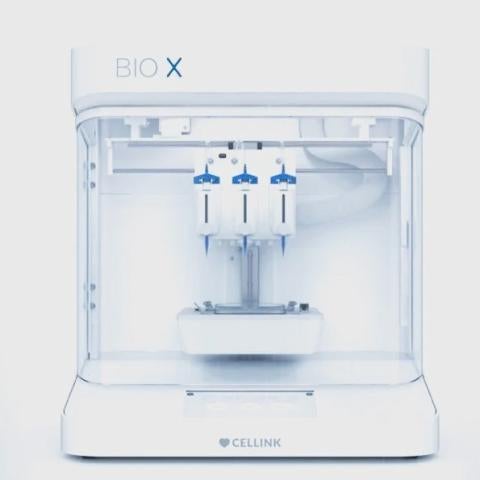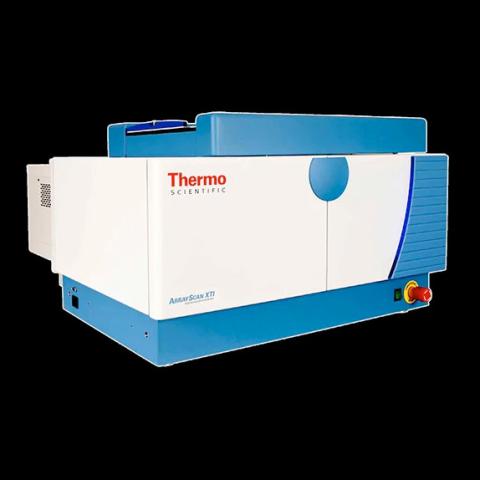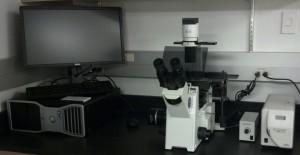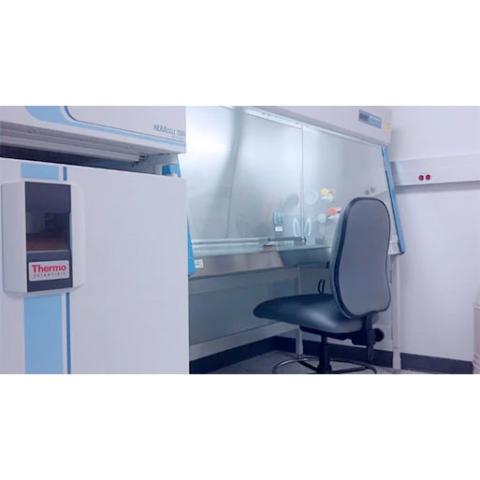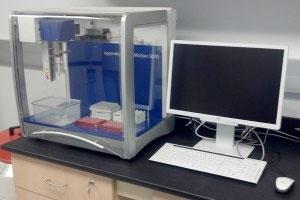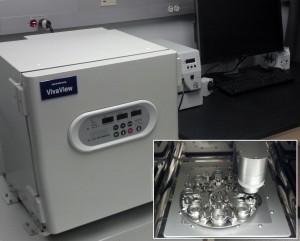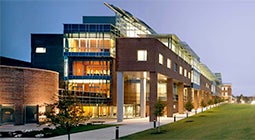Rensselaer’s Stem Cell Research Core is a recharge facility designed to provide equipment and training and informal discussions to investigators, academic and industry, currently engaged in or seeking to pursue stem cell and mammalian cell biology research. Our state-of-the-art multi-laboratory facility supports collaborative projects involving cell biology, biomedical engineering, chemical engineering and informatics research. We offer consultation for academic and industry partners regarding the design and performance of investigations, including the selection of cell types, phenotypic analysis, and imaging strategies.
The laboratory is a fully equipped aseptic cell culture facility that supports hypoxic studies and rapid workflow development including automated liquid handling, high-content and time-lapse imaging, and specialized algorithms for data analysis. We also provide stem cell-dedicated cell culture equipment, including tabletop centrifuges; two Olympus CKX inverted microscopes; two Olympus SZX stereo microscopes; 4 °C, –20 °C, –80 °C and liquid nitrogen storage; dedicated space for derivation of Induced Pluripotent Stem Cells (iPSCs) and transgenic cell lines. As a member of stem cell COREdinates consortium researchers can avail resources and technical expertise from the consortium.
Rensselaer’s Stem Cell Research Core has received support from the New York Stem Cell Initiative (NYSTEM C026717) and the New York Spinal Cord Injury Research Board (SCIRB, C030080 and C030239).
Contact Information: 
Karthikeyan Narayanan, Ph.D.
Stem Cell Core Director
narayk@rpi.edu
SERVICES
Research projects involving pluripotent stem cells (PSCs) must be approved by the Institutional Stem Cell Research Oversight (ISCRO). Our policy complies with National Academy of Science (NAS), National Institutes of Health and International Society of Stem Cell Research (ISSCR) standards for human stem cell research that are the current guiding principles used in the United States for work in this field, as well as New York Empire State Stem Cell Board (ESSCB) requirements.
Cryopreserved PSCs (ESCs and iPSC lines) are available to researchers for training purposes and preliminary research (contact us to know more these lines). Stem cell core biobanking is available to faculties or researchers who wish to share their laboratory developed cell lines (healthy or disease).
We provide service to characterize ESCs and iPSCs using routine methods (pluripotency and tri-lineage differentiation). Several mouse or human ESCs are available at ATCC and WiCell . Additionally multiple disease specific somatic cells isolated from patients are available through Coriell Institute and these cells can be reprogrammed to iPSCs for disease modeling. In general a letter agreement or MTA and shipping are required to obtain cells. If you have questions or need assistance, please contact Karthikeyan Narayanan.
Differentiation of stem cells are routinely carried out via either embryoid body or directed differentiation methods. Stem Cell Core assist in protocol development and establishment of functional cells for downstream applications. We provide 2D and 3D differentiation strategies towards hepatocytes, endothelial, neurons (cortical and dopaminergic), cardiomyocytes etc. yielding functional cells.
Organoids have transformative potential in scientific discovery and healthcare, offering versatile applications in drug development, personalized medicine, and regenerative medicine. The facility aims at accelerating organoid-based scientific research and drug discovery. Organoids, often referred to as mini-organs, are laboratory-grown structures composed of self-organizing cells that closely mimic respective physiology. This technology has emerged as one of the most effective models for studying human development and disease. The core facility offers training for researchers interested in organoid technology derived from either pluripotent stem cells or primary tissues. as a fee-for-service. addressing technical challenges such as quality control and reproducibility commonly associated with organoid research.
Stem cell core offers reprogramming of somatic cells obtained from either fibroblast (skin punch biopsy) or peripheral blood mononuclear cell (PBMC) (blood) to generate iPSCs followed by clonal selection, expansion and cryopreservation. Reprogramming are performed with either foot-print free systems or conventional Yamanaka factor (OKSM). We do offer services to characterize developed iPSC lines which includes pluripotency analysis, tri-lineage differentiation and karyotyping.
The core also offer isolation of adult stem cells from tissue samples collected from rat, mice and human. For example isolation of LGR5+ stem cells from intestine and colon to develop intestinal and colon organoids.
Stem Cell Core provide gene editing services using CRISPR/Cas9 system. We use gene specific gRNAs with RNPs and Cas9 protein to generate point mutations, deletions or insertions. Turnover time depends on individual project and cell line to edit. Please feel free to contact us.
Exosomes are small extracellular vesicles (30–150 nm in diameter) secreted by most cell types into the extracellular space. They play a pivotal role in intercellular communication by transferring bioactive molecules, such as proteins, lipids, and nucleic acids, between cells.
Stem Cell Core offers exosome isolation and characterization from various sources, including cell culture supernatant, plasma, serum, urine, saliva, and cerebrospinal fluid. Each source may require specific isolation protocols, contact us for more details.
3D bioprinting is a cutting-edge technology that enables the fabrication of complex biological structures using bioinks, which are composed of living cells, biomaterials, and growth factors. This technique draws on principles from 3D printing to produce tissue-like structures that mimic the architecture and functionality of natural tissues. It holds significant promise for applications in regenerative medicine, drug testing, and organ transplantation.
Stem cell core has an extrusion based BIO X 3D bioprinter from Cellink with temperature controllable printheads and UV curing. If you have any questions on selecting bioinks for 3D bioprinting, please contact us (email).
SCIENTIFIC RESOURCES
Stem Cell Science
A bi-weekly show covering the latest in stem cell news and technological advances
A consortium of human pluripotent stem cell-focused core facilities
Stem cell information and protocols
Stem Cell Registry, U.S. Stem Cell Policy
Open access journal from Cell Press
Open access journals covering a range of topics
Developmental Biology
From the University of New South Wales, including Carnegie Stages of Human Development
Database of gene expression images maintained by the University of California, Santa Cruz
Biotechnology and Commercialization
University-Industry Demonstration Partnership
An organization that seeks to identify issues impacting university-industry (U-I) relations and opportunities to develop new approaches to working together, which arose originally as a joint venture of the National Academies.
A guide for successful institutional-industrial collaborations
Syracuse University law center that helps to promote commercialization of new technologies
Training
Stem Cell Core is a BSL2 facility and all users must receive proper training before being permitted access Stem Cell Core and the equipment. Training is provided by the Core Director.
Online Scheduling
Advance reservation using iLab online scheduling calendar is required. The billing is based on the length of occupation time, which is calculated based on the equipment log records.
To schedule time in the facility:
- Click on this https://rpi.corefacilities.org/account/login link to open the iLab website in a new window.
- Click the ‘Login’ button on the site allows you to enter your RCS username and password.
- Please be mindful while scheduling equipment and cancel reservation if not needed as soon as possible.
If your work in the Rensselaer Center for Stem Cell Research contributes to a publication, please acknowledge the “RPI Stem Cell Research Facility, funded by NYSTEM C026717.”
Technology
